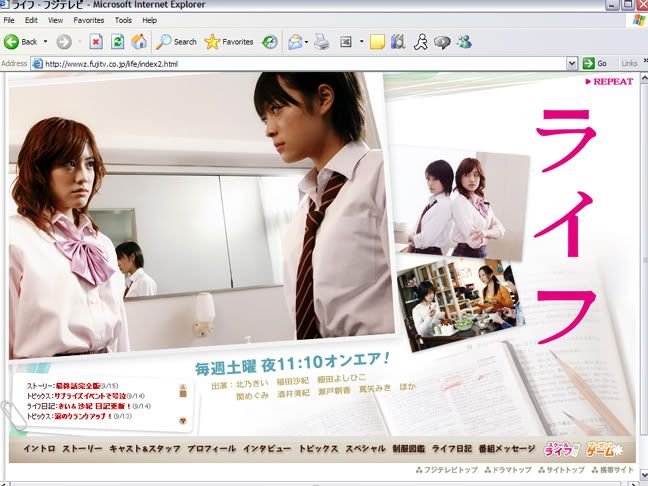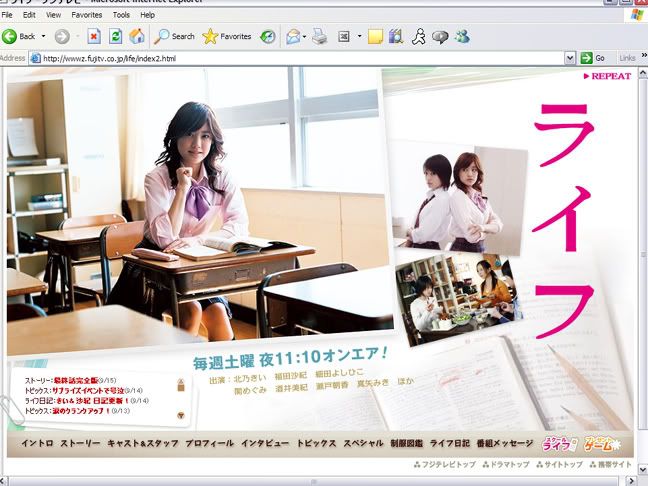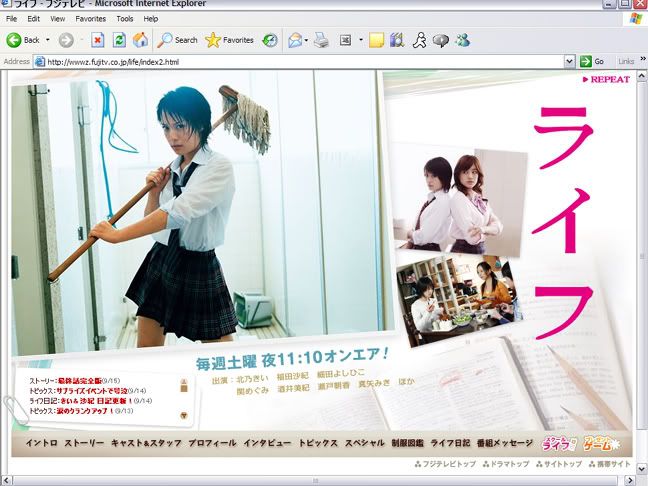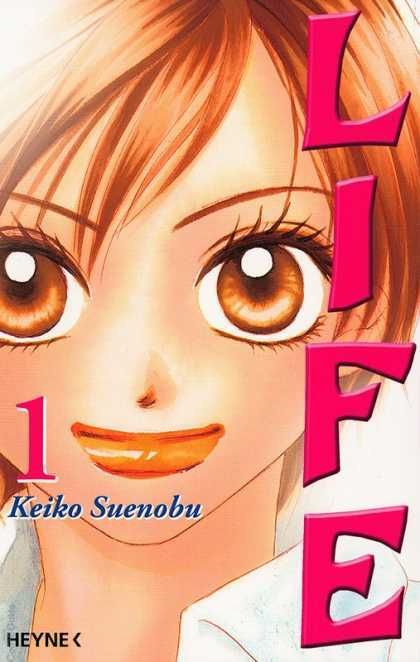Sometimes my life in Japan collides with my love of comic books and this is one of those times. Life, a TV drama based on a comic series by the same name concluded here a few weeks ago after 11 episodes of Japanese high school bullying, teen angst, torture, mayhem, lies and suicide attempts. It was a big hit and even a fellow American friend and I got hooked on it despite our not really being able to understand everything that the characters were saying.
See, here in Japan comics provide source material for any number of movies, cartoons and TV shows without the "superhero" or "just for kids" stigma that's sometimes attached in such properties in the West, unless it's a big summer blockbuster- the cinematic equivalent of Amazons Attack. I mean, how many times did you hear the movie A History of Violence was based on a graphic novel? Or that Road to Perdition was based on a comic that was in turn based on Japanese comic? If you did, you were really paying attention.
Oh... and by "the West," I mean Canada and the United States. And possibly some superhero comics-savvy parts of Europe.
Japan doesn't have this tradition of comics-are-strictly-for-kids. Yeah, you have lots of childish stuff but in general comics terms, pretty much everyone reads them, without fear of being considered weird or oddball (although those people exist here too). While fantasy genres predominate, there are also completely mainstream comics featuring more down-to-earth storylines like you might find in small press comics in the United States and Canada. Only instead of selling about 3000 issues like Love & Rockets, these comics sell hundreds of thousands, if not millions.
In Japan, romance comics still exist as a viable part of the mainstream market. For example Nana, a comics series about two girls both named Nana who become friends that inspired not one but two popular feature films. The Nova staff in Hamamatsu loved the Nana comic while I was working there. Copies of it littered their lunch table in the back for months.
Which brings us back to Life. Life is the genre-bending (romance, slice-of-life drama, horror/suspense) story of Ayumu, who suffers the heartbreak of having gotten into a toney high school and losing her best friend from junior high who didn't score enough on the entrance exam. Her moping catches the eye of the lovely Manami, a stylish girl with hair perfectly coiffed and dyed brown. Sensing that Ayumu's in grave danger of becoming a goth and listening to Dresden Dolls instead of SMAP as befits a proper high school girl, Manami decides to act.
Here are the protagonists/antagonists of Life. The girl on the left is Manami and the girl on the right is Ayumu:
 At lunch, Manami finds a weepy Ayumu on the playground, takes a set of hashi hashi and force-feeds the girl fried egg from her bento. Ayumu's tears become a smile, they go to a photobooth and do purikura together and everything's going to be all right after all. The end!
At lunch, Manami finds a weepy Ayumu on the playground, takes a set of hashi hashi and force-feeds the girl fried egg from her bento. Ayumu's tears become a smile, they go to a photobooth and do purikura together and everything's going to be all right after all. The end!
Wrong!
Here's the lovely and cruel yet nutrition-conscious Manami, sitting at her desk contemplating more playground force-feedings: Kids being kids, their burgeoning friendship soon falls apart and Manami and her gang begin bullying Ayumu, slopping wet mops in her face in the bathroom and covering her desk with cruel grafitti. And sometimes tossing it out the window. Things get even worse as Manami's sicko-psycho boyfriend Katsumi joins in, adding kidnapping, blackmail, torture and... I'm not sure about this because I missed the early episodes... rape to the mix. Katsumi is also involved in a relationship with the kids' pro-Manami/anti-Ayumu homeroom teacher.
Kids being kids, their burgeoning friendship soon falls apart and Manami and her gang begin bullying Ayumu, slopping wet mops in her face in the bathroom and covering her desk with cruel grafitti. And sometimes tossing it out the window. Things get even worse as Manami's sicko-psycho boyfriend Katsumi joins in, adding kidnapping, blackmail, torture and... I'm not sure about this because I missed the early episodes... rape to the mix. Katsumi is also involved in a relationship with the kids' pro-Manami/anti-Ayumu homeroom teacher.
On the plus side, Ayumu becomes quite adept at mop-fu, an ancient mop based form of martial arts handed down by janitors for generations: Yeah, and you thought your high school was hell. As the series continues, Ayumu gains some allies in Miki, a beautiful but mysterious girl, and some nerdy guy whose name I never caught. She learns to stand up for herself both at school and at home (her mom is well-meaning but tends to ignore her). The Ayumu-bullying continues until Manami falls from favor and replaces her as everyone's target. What goes around...
Yeah, and you thought your high school was hell. As the series continues, Ayumu gains some allies in Miki, a beautiful but mysterious girl, and some nerdy guy whose name I never caught. She learns to stand up for herself both at school and at home (her mom is well-meaning but tends to ignore her). The Ayumu-bullying continues until Manami falls from favor and replaces her as everyone's target. What goes around... The drama plays like a shopping list of social issues facing teenaged girls in today's world. Also there are so many plot reversals you half expect everyone to start talking backwards. Evidently, the manga is even more a hit parade because in it, Ayumu is also a cutter. That element is conspicuously absent from the TV show.
The drama plays like a shopping list of social issues facing teenaged girls in today's world. Also there are so many plot reversals you half expect everyone to start talking backwards. Evidently, the manga is even more a hit parade because in it, Ayumu is also a cutter. That element is conspicuously absent from the TV show.
I'm not sure about the prevalence of cutting here in Japan. I've talked to some of my high school students briefly about Life and bullying, but only one girl knew what cutting was. She told me she has a friend who actually deliberately sliced her own face. Perhaps the others just didn't want to talk to their ugly bald gaijin teacher about it, and not willing to intrude on their lives, I didn't press.
Bullying is familiar, though. And thanks to some recent bullying-induced suicides, it's been a favorite topic in media. People are scared for their children, who don't seem to understand they can go to an adult and get help. Although much like in the case of Ayumu, sometimes the authorities just try to cover it up or take the wrong side. This makes Life a timely show, with a compelling message- develop your self-esteem and stand up for yourself because those who bully you today may themselves become the victims of bullying tomorrow.
Oh... and I have to point out the theme song for Life is sung by Nakashimi Mika, who played the punk rock Nana in... uh... Nana. Nana! Currently, it's #6 on the J-Pop charts. The TV drama uses it about 30 times per episode, whenever the action reaches a dramatic crescendo or to underscore a quiet melancholy scene.
No comments:
Post a Comment